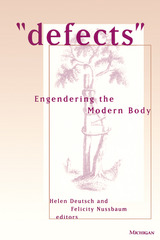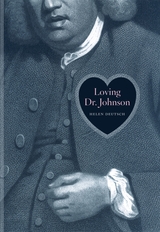3 books by Deutsch, Helen

"Defects"
Engendering the Modern Body
Helen Deutsch and Felicity Nussbaum, Editors
University of Michigan Press, 2000
"Defects" brings together essays on the emergence of the concept of monstrosity in the eighteenth century and the ways it paralleled the emergence of notions of sexual difference. Women, declared a mid-eighteenth-century vindication, have been regarded since Aristotle as deformed amphibious things, "neither more or less than Monsters" (Beauty's Triumph 1758). This alliance of monstrosity with misogyny, along with the definition of sexual difference as aberration, is the starting point for this volume's investigation of monstrosity's cultural work in the eighteenth century and its simultaneous mapping and troubling of the range of differences.
This collection investigates the conceptual and geographical mapping of early modern and Enlightenment ideas of monstrosity onto a range of differences that contested established categories. The essays consider the representations and material dimensions of phenomena as diverse as femininity and disfigurement, the material imagination and monstrous birth, ugliness as an aesthetic category, deafness and theories of sign language, and the exotic, racialized deformed. Collectively, they demonstrate that the emergence of sexual difference is inextricably intertwined with the emergence of a category of the human that is imagined and deformed, monstrous, and ugly. Contributors include Barbara Benedict, Jill Campbell, Elizabeth Heckendorn Cook, Lennard Davis, Helen Deutsch, Robert Jones, Cora Kaplan, Nicholas Mirzoeff, Felicity Nussbaum, Stephen Pender, and Joel Reed.
Helen Deutsch is Professor of English, University of California at Los Angeles. Her most recent book is Resemblance and Disgrace: Alexander Pope and the Deformation of Culture. Felicity Nussbaum is Professor of English, University of California at Los Angeles. Her most recent book is Torrid Zones: Maternity, Sexuality, and Empire in Eighteenth-Century English Narrative.
This collection investigates the conceptual and geographical mapping of early modern and Enlightenment ideas of monstrosity onto a range of differences that contested established categories. The essays consider the representations and material dimensions of phenomena as diverse as femininity and disfigurement, the material imagination and monstrous birth, ugliness as an aesthetic category, deafness and theories of sign language, and the exotic, racialized deformed. Collectively, they demonstrate that the emergence of sexual difference is inextricably intertwined with the emergence of a category of the human that is imagined and deformed, monstrous, and ugly. Contributors include Barbara Benedict, Jill Campbell, Elizabeth Heckendorn Cook, Lennard Davis, Helen Deutsch, Robert Jones, Cora Kaplan, Nicholas Mirzoeff, Felicity Nussbaum, Stephen Pender, and Joel Reed.
Helen Deutsch is Professor of English, University of California at Los Angeles. Her most recent book is Resemblance and Disgrace: Alexander Pope and the Deformation of Culture. Felicity Nussbaum is Professor of English, University of California at Los Angeles. Her most recent book is Torrid Zones: Maternity, Sexuality, and Empire in Eighteenth-Century English Narrative.
[more]

Loving Dr. Johnson
Helen Deutsch
University of Chicago Press, 2005
The autopsy of Samuel Johnson (1709-84) initiated two centuries of Johnsonian anatomy-both in medical speculation about his famously unruly body and in literary devotion to his anecdotal remains. Even today, Johnson is an enduring symbol of individuality, authority, masculinity, and Englishness, ultimately lending a style and a name—the Age of Johnson—to the eighteenth-century English literary canon.
Loving Dr. Johnson uses the enormous popularity of Johnson to understand a singular case of author love and to reflect upon what the love of authors has to do with the love of literature. Helen Deutsch's work is driven by several impulses, among them her affection for both Johnson's work and Boswell's biography of him, and her own distance from the largely male tradition of Johnsonian criticism—a tradition to which she remains indebted and to which Loving Dr. Johnson is ultimately an homage. Limning sharply Johnson's capacious oeuvre, Deutsch's study is also the first of its kind to examine the practices and rituals of Johnsonian societies around the world, wherein Johnson's literary work is now dwarfed by the figure of the writer himself.
An absorbing look at one iconic author and his afterlives, Loving Dr. Johnson will be of enormous value to students of English literature and literary scholars keenly interested in canon formation.
Loving Dr. Johnson uses the enormous popularity of Johnson to understand a singular case of author love and to reflect upon what the love of authors has to do with the love of literature. Helen Deutsch's work is driven by several impulses, among them her affection for both Johnson's work and Boswell's biography of him, and her own distance from the largely male tradition of Johnsonian criticism—a tradition to which she remains indebted and to which Loving Dr. Johnson is ultimately an homage. Limning sharply Johnson's capacious oeuvre, Deutsch's study is also the first of its kind to examine the practices and rituals of Johnsonian societies around the world, wherein Johnson's literary work is now dwarfed by the figure of the writer himself.
An absorbing look at one iconic author and his afterlives, Loving Dr. Johnson will be of enormous value to students of English literature and literary scholars keenly interested in canon formation.
[more]

Resemblance and Disgrace
Alexander Pope and the Deformation of Culture
Helen Deutsch
Harvard University Press, 1996
Like the miniatures of which Pope was so fond, the book is at once particular in its focus and wide-ranging in its conceptual scope. While drawing on recent feminist, historicist, and materialist criticism of Pope, as well as current theoretical work on the body, it also attends closely to the local ambiguities of the poet’s texts and cultural milieu, details often lost to critical view. The result is a revitalized—and broadened—reading of Pope, and of our understanding of the processes of authorship. By focusing on the process by which ideas of authority and authenticity took shape at specific moments in Pope’s career, Resemblance and Disgrace calls into question distinctions between theoretical abstractions and material details, between literary originality and critical derivation, following Pope’s own example of rewriting intellectual boundaries as creative opportunities.
[more]
READERS
Browse our collection.
PUBLISHERS
See BiblioVault's publisher services.
STUDENT SERVICES
Files for college accessibility offices.
UChicago Accessibility Resources
home | accessibility | search | about | contact us
BiblioVault ® 2001 - 2024
The University of Chicago Press









